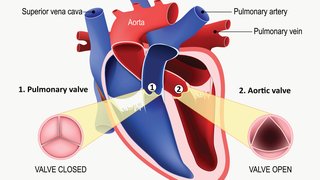
Cardiac disease in men and women: Yes, there are differences
When it comes to cardiac disease, there often are notable differences between genders in the presenting symptoms and even some risk factors. Aside from the species part, I won't argue his point, but when it comes to cardiac disease, there often are notable differences between genders in the presenting symptoms and even some risk factors.
A large portion of my practice happens to be devoted to treating women. I see patients for a variety of conditions, including vascular heart disease and cardiovascular disorders during pregnancy, as well as for preventive cardiac care.
Over the years, I've been asked questions centered around the differences in how heart disease affects men and women. Five of the most common inquiries are variations of the following;
Do men and women exhibit signs of cardiac disease differently?
Most adults are familiar with the classic image of a patient clutching his or her chest due to the pressure associated with a heart attack, but many are unaware that atypical symptoms of heart problems are just as common – and particularly so in women. In fact, atypical symptoms such as nausea, indigestion, shortness of breath, or elbow or jaw discomfort may be the presenting symptoms of coronary artery disease in women. Health care providers must be attuned to the wide variety of presentations and their relationship to gender.
What are the risk factors for coronary disease in women?
They include tobacco use, hypertension, diabetes, obesity, family history of premature coronary artery disease, and lipid disorders. Interestingly, high triglyceride levels are a predictor of coronary artery disease risk in women, but not in men.
Is there a particular symptom that women should pay more attention to?
There is no particular symptom that women should pay closer attention to than another, but unusual development of chest discomfort, indigestion, breathing problems, or jaw/arm pain should warrant a discussion with the health care provider.
What are the top things women can do to prevent heart disease?
- Don’t smoke.
- Manage weight to reduce the risk of diabetes.
- Exercise regularly.
- Control blood pressure.
Why do you think breast cancer gets more attention than heart disease in women?
I think breast cancer gets more attention because it is more likely to impact the lives of younger women than coronary artery disease. On average, coronary artery disease occurs in women approximately 10 years older than in men. Many of the heart attacks in women with coronary artery disease happen in their 70s and 80s.










